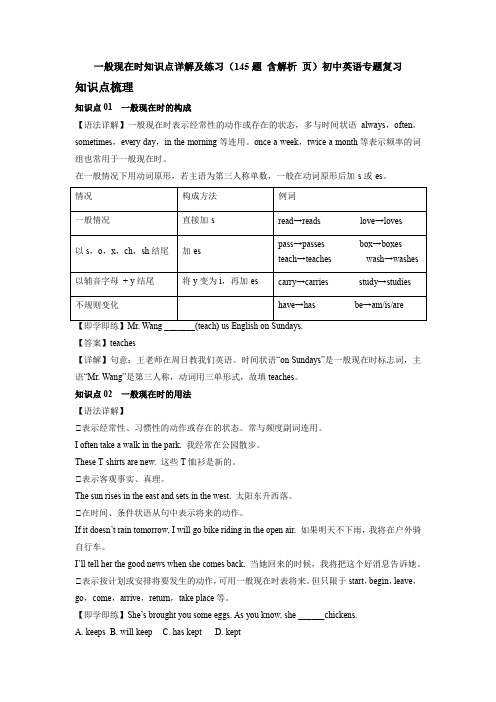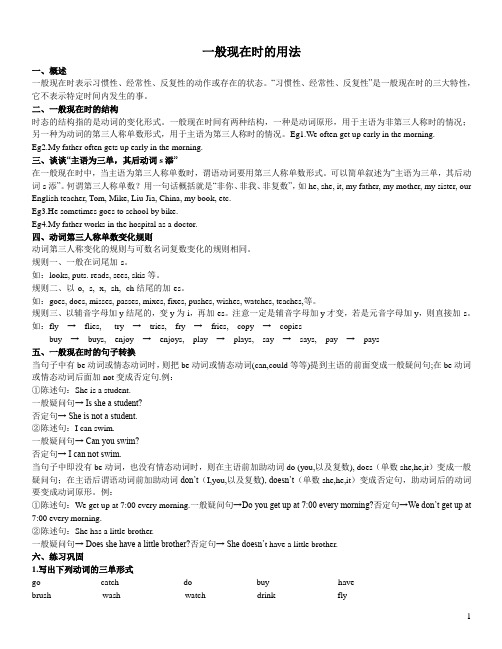2019考研英语语法解析:一般现在时_毙考题
一般现在时知识点详解及练习(145题 含解析 页)初中英语专题复习

一般现在时知识点详解及练习(145题含解析页)初中英语专题复习知识点梳理知识点01 一般现在时的构成【语法详解】一般现在时表示经常性的动作或存在的状态,多与时间状语always,often,sometimes,every day,in the morning等连用。
once a week,twice a month等表示频率的词组也常用于一般现在时。
在一般情况下用动词原形,若主语为第三人称单数,一般在动词原形后加-s或-es。
【答案】teaches【详解】句意:王老师在周日教我们英语。
时间状语“on Sundays”是一般现在时标志词,主语“Mr. Wang”是第三人称,动词用三单形式,故填teaches。
知识点02 一般现在时的用法【语法详解】①表示经常性、习惯性的动作或存在的状态。
常与频度副词连用。
I often take a walk in the park. 我经常在公园散步。
These T-shirts are new. 这些T恤衫是新的。
①表示客观事实、真理。
The sun rises in the east and sets in the west. 太阳东升西落。
①在时间、条件状语从句中表示将来的动作。
If it doesn’t rain tomorrow, I will go bike riding in the open air. 如果明天不下雨,我将在户外骑自行车。
I’ll tell her the good news when she comes back. 当她回来的时候,我将把这个好消息告诉她。
①表示按计划或安排将要发生的动作,可用一般现在时表将来。
但只限于start,begin,leave,go,come,arrive,return,take place等。
【即学即练】She’s brought you some eggs. As you know, she ______chickens.A. keepsB. will keepC. has keptD. kept【详解】句意:她给你带了些鸡蛋。
中考英语考点梳理:一般现在时语法详解!

一.一般现在时有三种形式1. 谓语是be(am/is/are)的一般现在时。
①肯定形式:主语+be+表语(形容词、名词充当表语)。
I am hungry.You are beautiful.He is a doctor.②否定形式:主语+be+not+表语(形容词、名词充当表语)。
I am not hungry.You aren't beautiful.He isn't a doctor.③一般疑问句形式:Be+主语+表语(形容词、名词充当表语)?肯定回答:Yes,主语+be. 否定回答:No, 主语+ be+not.—Are you hungry?—Yes,I am./No,I'm not.—Is he a doctor?—Yes, he is./No, he isn,t.④特殊疑问句形式:特殊疑问词+Be开头的一般疑问句?—What is he?—He is a doctor.注意:be要随着主语变。
2. 谓语动词是实义动词(及物动词或不及物动词)的一般现在时。
①肯定形式:“主语+及物动词+宾语”或“主语+不及物动词”。
She has a little brother.她有一个弟弟。
The sun rises in the east.太阳从东方升起。
②否定形式:“主语+don't/doesn't+及物动词+宾语”或“主语+don't/doesn't+不及物动词”。
She doesn't have a little brother.她没有弟弟。
I don't eat every morning.我每天早晨都不吃饭。
③一般疑问句形式:“Do/Does+主语+及物动词原形+宾语”或“Do/Does+主语+不及物动词原形”。
肯定回答:Yes,主语+do/does. 否定回答是:No, 主语+ don't/doesn't.—Do you eat every morning?—Yes, I do./No, I don't.—Does she have a little brother?—Yes, she does./No, she doesn't.④特殊疑问句:特殊疑问词+do/does开头的一般疑问句?What do you like?When do you go to school?注意:根据主语确定用do还是does。
中考时态汇总讲解+习题(现在,过去,将来,进行,完成)

一般现在时的用法一、概述一般现在时表示习惯性、经常性、反复性的动作或存在的状态。
―习惯性、经常性、反复性‖是一般现在时的三大特性,它不表示特定时间内发生的事。
二、一般现在时的结构时态的结构指的是动词的变化形式。
一般现在时间有两种结构,一种是动词原形,用于主语为非第三人称时的情况;另一种为动词的第三人称单数形式,用于主语为第三人称时的情况。
Eg1.We often get up early in the morning.Eg2.My father often gets up early in the morning.三、谈谈“主语为三单,其后动词s添”在一般现在时中,当主语为第三人称单数时,谓语动词要用第三人称单数形式。
可以简单叙述为―主语为三单,其后动词s添‖。
何谓第三人称单数?用一句话概括就是―非你、非我、非复数‖,如he, she, it, my father, my mother, my sister, our English teacher, Tom, Mike, Liu Jia, China, my book, etc.Eg3.He sometimes goes to school by bike.Eg4.My father works in the hospital as a doctor.四、动词第三人称单数变化规则动词第三人称变化的规则与可数名词复数变化的规则相同。
规则一、一般在词尾加-s。
如:looks, puts. reads, sees, skis等。
规则二、以-o, -s, -x, -sh, -ch结尾的加-es。
如:goes, does, misses, passes, mixes, fixes, pushes, wishes, watches, teaches,等。
规则三、以辅音字母加y结尾的,变y为i,再加-es。
注意一定是辅音字母加y才变,若是元音字母加y,则直接加-s。
考研语法重点语法知识点整理与练习

考研语法重点语法知识点整理与练习在考研英语中,语法是一个重要的考点。
掌握好语法知识点,对于提高语法解题能力和应对考试具有重要意义。
本文将为大家整理考研语法的重点知识点,并结合相应的练习题进行讲解。
一、时态1. 一般现在时(Simple Present)表示经常性、习惯性的动作、事实、存在等情况。
例句:She often goes to the gym.(她经常去健身房。
)练习题:改写下列句子,使用一般现在时。
1) I am studying English now.2) They are playing basketball in the park.3) He is listening to music at home.2. 现在进行时(Present Continuous)表示现阶段正在进行的动作。
例句:I am reading a book right now.(我现在正在读书。
)练习题:改写下列句子,使用现在进行时。
1) She reads books every day.2) They go swimming in the summer.3) He plays football on Sundays.3. 一般过去时(Simple Past)表示过去某个时间发生的动作或状态。
例句:We watched a movie yesterday.(昨天我们看了电影。
)练习题:改写下列句子,使用一般过去时。
1) I am busy now.2) They are at home.3) She is a doctor.4. 过去进行时(Past Continuous)表示过去某个时间正在进行的动作。
例句:He was studying when I called him.(我给他打电话时,他正在学习。
)练习题:改写下列句子,使用过去进行时。
1) They play tennis every weekend.2) She writes a letter to her friend.3) He helps his mother with housework.5. 现在完成时(Present Perfect)表示过去发生的动作对现在造成的影响或结果。
2019中考动词时态考查热点

2019中考动词时态考查热点透视动词时态是中考英语的考查热点之一。
本文以近几年全国部分省市的中考试题为例,对常考查的动词时态作一归纳,希望能对同学们的学习有所帮助。
[考点一] 一般现在时[点拨] (1) 概念:表示经常性、习惯性的动作,表示现在的状态或特征,还表示普遍真理或客观事实。
(2) 与之连用的时间状语有always,often,usually,sometimes,every day,once a week等。
(3) 适用的动词种类有:系动词;行为动词。
(4) 注意:如果主语是第三人称单数时,其谓语动词末尾要加-s或-es;在时间状语从句和条件状语从句中,可用一般现在时表示将来时间。
例如:1. Every year many foreigners________to China to learn Chinese.A. have comeB. comesC. cameD. come[答案与简析] 答案为D。
every year通常与一般现在时连用。
主语many foreigners含复数意义,故谓语动词为复数形式。
2. Your teacher will be unhappy if you________to school late.A. comeB. will comeC. are comingD. came[答案与简析] 答案为A。
主句中will be表示将来时间,在if引导的条件状语从句中,谓语动词用一般现在时表示将来时间。
3. —Is your father a doctor?—Yes,he is. He________in Town Hospital.A. has workedB. had workedC. worksD. worked[答案与简析] 答案为C。
由答语“Yes,he is.”我们可知,接下来的句子中应该用一般现在时。
4. A large number of students in this school________from the country. They work very hard.A. comeB. comesC. cameD. coming[答案与简析] 答案为A。
2019年中考英语八大时态语法讲解

2019年中考英语八大时态语法讲解2019年中考英语八大时态语法讲解(绝对精品文档,价值很高,值得下载打印背诵) 一般现在时概念:1. 表示现在的状态eg:I am twelve.2. 表示经常或习惯性动作eg:he gets up at six.3. 表示主语所具备的性格或能力eg:he likes English.4. 表示客观事实真理eg:the earth goes around the sun.标志性词语:Often,usually,sometimes,always,never,on Sunday,every year/month/dayEg: she often goes to school on foot.He goes to park once a week.行为动词第三人称单数加-s 的形式1. 一般动词直接加-s2. 以辅音字母+y,把 y 改 i 再加 es,3. 以 s,x,sh,ch 结尾的动词加-es4. 以 o 结尾的动词一般加-es5. 特殊情况:have—has基本结构:Be 型:肯定式:主语+be 动词(am/is/are)+其他表状态(there be+n)否定式:主语+be 动词(am/is/are)+not+其他疑问式:将 be 动词提前放句首,第三人称动词变原形(一二人称互换,第三人称不变)特殊式:特殊疑问词+be+主语实义动词型:肯定式:主语+行为动词(注意人称三单形式)+其他否定式:主语+do n’t/doesn’t+行为动词+其他疑问式:一般式:Do/Does+主语+行为动词原形+其他特殊式:特殊疑问词+do/does+主语+谓语小试牛刀:写出下列动词的第三人称形式wash:match:study:finish:go:snow:carry:stop:see:drive:let:teach:keep:join:put:do:drink:toy:play: begin:take:run:fly:talk:stay:look:watch:think:carry:fix:单项选择1. There an English film at the cinema now.A:is B:are C:am D:be2. The picture nice.A:look B:looks C:looked D:be look3. He sits down and soon asleep.A:fall B:falling C:falled D: falls4. The water sweet.A:drinking B:drinks C:drink D:to drink5. I up at six but Mike up at sevenA:get,gets B:get ,get C:gets,get D:getting, to get6. My father for eight hours every day.A:working B:works C:work D:to work7. Uncle Wang never English, because he know how to say it.A:speak,doesn’t B:speak,don’t C:speaks,don’t D:speaks,doesn’t8. On Sunday my daughter watching TV and my son to play footballwith his friends.A:like,want B:likes,want C:like,wants D:likes,wants 9. Su Yangusually some clothes on Sunday.A:washed B:washs C:washes D:washing 10. Su Hai and Su Yang eight lessons this termA:have B:has C:haves D:having用所给词的正确形式填空A. We often (not play)on the playground.B.you (brush) your teeth every day.C. How many lessons your classmate (have) on Sunday.D. It (take) me two hours to finish my homework every day.E. The child often (watch) TV in the evening.F. What (do) he usually (do) after school.G. John (study) Math , Chinese ,English ,Science and Art at school.H. Mr. Wang often (go) to Shanghai.I. There (be) a football match on TV every morning.J. We (not watch)TV on Monday.句式训练Do you like to play football after school?肯定句肯定/否定回答:I have many books.否定句:一般疑问句:肯定回答:否定回答:Nancy doesn’t run fast.肯定句:I usually play football on Friday afternoon.一般疑问句:特殊疑问句:肯定/否定回答:Tom does his homework at home. 否定句:一般疑问句:特殊疑问句:Mike has two letters for him.一般疑问句:特殊疑问句:否定回答:判断正误1. Is your brother speak English?2. Does he likes going fishing?3. Jane do his homework every morning.4. He like play basketball with his friends.5. We eats dinner at six and go to bed at eleven.6. My dog runs fast.7. He speak English very well.8. What do they usually do on Saturday.9. My mother don’t have breakfast this morning.10. I like reading books on the library every day.中考真题1.Jenny! Do you know that one-third of the boys in our class the singer Zhang Shao Han?A. likeB. likesC.liking2. The sense of happiness will increase if you what you like to do.A. doB. didC. will do3. Betty will ring me up when she inBeijing.A. arriveB. arrivesC. arrivedD. willarrive4. If you your homework, you can go out to play football.5.Now my father his bike to work every day instead of driving.A. rideB. r od eC. ridesD. will ride6. This girl is rea d y t o help p eo pl e an y time. Wh e n sh e is on t h e bu s,sh e al w a y s her seat to someone in need.A. givesB. giveC. gaveD.giving概念:一般过去时表示过去某个时间収生的动作或存在的状态. Eg: I got up at seven yesterday表示过去经常収生的动作或存在的状态. Eg: he always went to school by car last term标志性词语:yesterday,last month/year/week/night,the day beforeyesterday,in the past,at that time,two days ago,just n ow……..动词过去时的变化规则:一般在词尾直接+ed play——played以 e 结尾的动词直接+d taste—— tasted末尾三个字母以“辅+元+辅”且为重读闭音节,双写末尾辅音+ed stop——stopped以辅音字母+y,改 y 为 i 再+ed study——studied不规则动词过去式:am/is: a re:do:see:sa y:give: eat:w rit e: sp en d:get:take:sp eak:drin k:g o:r un:rid e:sle ep:c o me:sin g:swim:s t and:has/ha ve:pu t:sit:rea d:结构:Be 型肯定式:主语+be 动词(was/were)+其他否定式:主语+wasn’t/weren’t+其他疑问式:Be 动词+主语+其他(一二人称互换,第三人称不变)特殊疑问句:特殊疑问词+was/were+主语+其他实义动词型肯定式:主语+动词过去式+其他否定式:主语+didn’t+动词原形+其他疑问式:Did+主语+动词原形+其他特殊疑问句:特殊疑问词+did+主语+动词原形+其他用所给单词正确形式填空◆We (enjoy) ourselves at the party last night.◆Jack (study) for the English test last Sunday.◆ you (go) to the Great Wall last year?◆What day (be) it yesterday?◆The old man (be)ill and went to see a doctor.◆We (have) a party last night.◆We (visit) the museum and went home.◆—How (be) the students? —They were very friendly.◆My mother (not do) housework yesterday. ◆—he (have) lunch at nine? —No, he did n’t.◆They (buy) a guitar yesterday.◆the cat (eat)a bird yesterday night.◆They (play)chess in the classroom last PE lesson.◆Nancy (pick)up orange on the farm last week.◆My mother (cook)a nice food last spring festival.◆I (be)at school just now.◆He (be)at the camp last week.◆The mobile phone (be)on the table yesterday evening.◆I (make)a model ship with Mike yesterday.◆What (do)you do last month.单项选择( ) 1. Lee his mobile phone at home.A. leaveB. leavesC. leavedD. left( ) 2. he a good rest? No, he didn’t.A. Do, hadB. Did, haveC. Did, hadD. Was, had( ) 3. As soon as he , he to his family.A. arrived, writesB. arrived, writtenC. arrived, wroteD. arriveds, write( ) 4. Mr. Black was late because he his way.A. lostedB. loseC. losesD. lost( ) 5. When Lee school this morning?A. did, got toB. did, get toC. did, getD. did, got( ) 6. Will you please say it again? I quite you.A. didn’t, hearB. don’t, heardC. didn’t, heardD. don’t, hear ( ) 7. you at six o’c lock yesterday?A. Do ,get upB. Did, get upD. Did, got up ( ) 8.What did you see ?A. nowB. every dayC. these daysD. just now ( ) 9.He went into the room and the door.A. lockB. lockingC. locksD. locked ( ) 10. —What you last week? —I bought a bag.A. did ,buyB. did , boughtC. do, buyD. do, bought ( ) 11. —he his lunch? —Yes, he did.A. Does ,hasB. Does, haveC. Did, haveD. Did, had ( )12.—Did the thieves into the car? —No, they .A. fell, did n’tB. fall(落下), didC. jump(跳), didn’tD. jump, did ( ) 13. -When did May come back from Hong Kong?-She from Hong Kong last Friday.A. come backB. comes backC. returned backD. came back( ) 14. she this dictionary in the bookshop nearby last week?A. Did, buyC. Did, boughtD. Does, buys ( ) 15. He to the station this morning and was for the train.A. hurry, in timeB. hurries, on timeC. hurried, in timeD. hurried, at time句型转换1. Frank read an interesting book about history. (一般疑问句)Frank an interesting book about history?2. Thomas spent RMB 10 on this book. (否定句)Thomas RMB 10 on this book.3. I didn’t have any friends. (一般疑问句)have friends?4. She watched TV after supper(划线部分提问)she after supper.5. There was some orange in the fridge.(一般疑问句)there_ orange in the fridge?改错题1. How is Jane yesterday?2. He go to school by bus last week.3. He often goes home at 6:00 last month.4. I can fly kites seven years ago.5. Did you saw him just now.6. Tom wasn’t watch TV last night.7. I didn’t my homework yesterday. 8. He wait for you three hours ago.9. Who find it just now ? 10. What did he last week?综合训练。
完整版初中英语语法一般现在时专项讲解及练习
完整版初中英语语法一般现在时专项讲解及练习初中英语时态专题讲解一般现在时一、出以下情况是用一般在:经常性、习惯性的动作或存在的状态。
志:often常,usually通常,always是,every每个,sometimes有,at⋯在几点e.g.Igotoschoolonfoot.Heisverybusynow.Ioftendomyhomeworkat7:00.HeusuallygoestotheparkonSundaymorning.表示主语的特征、性格、能力、爱好等。
e.g.Hecanswim. Iworkhard. IlikewatchingTV.表示客观真理e.g.Therearesevendaysinaweek.Themoonmovesroundtheearth.二、一般在的句式化:1)表示动作,一般人称作主语的,变否认句须在动词前加助动词don’t;变一般疑问句须在句首加助动词do。
E.g.肯定句Theyhavelunchat12:00.否认句Theydon’thavelunchat12:00.疑问句Dotheyhavelunchat12:00? 肯定答复:Yes,theydo.否认答复:No,theydon’t.2〕单三人称做主语的,变否认句须在动词前加助动词doesn’t;变一般疑问句须在句首加助动词does。
e.g.肯定句:Hegoestoschoolbybike. 否认句:Hedoesn’tgotoschoolbybike.疑问句:Doeshegotoschoolbybike? 肯定答复:Yes,hedoes.否认答复:No,hedoesn’t1.She______(go)toschoolatseveno ’clock.否认句:一般疑句:2.Theyusually_____upat17:00.(get)否认句:一般疑句:3.Amy____(be)herejustnow.否认句:一般疑句:操1.Ihavemanybooks. 〔改为否认句〕doeshishomeworkathome.否认句:一般疑问句:usuallywaterstheflowers.1初中英语时态专题讲解否认句:一般疑问句YangusuallywashessomeclothesonSaturday.否认句:5.IusuallyplayfootballonFridayafternoon.否认句:一般疑问句:强化训练一、写出以下单词的第三人称单数形式1.work__________read__________clean__________write__________2.teach__________wash__________guess__________watch__________3.go__________do___________4.study__________fly__________cry__________play__________5.have__________二.选择()1._____youhaveabook?A.DoB.AreC.IsD.Have()2.They_________onafarm.working B.iswork C.working D.isworked()3.DoesPeterliketowatchTV?__________.A.Yes,helikeB.No,hedoesn’tC.Yes,he’dlikeD.No,helikes()4.Shedoesn’t__________herhomeworkintheafternoon.A.doingB.todoC.doesD.do()5.How____________Mr.Brown___________toAmerica?A.do,goB.is,goC.does,go D ()6.Where’smycamera?I____________it.A.amnotfindingB.amnotseeingC.can’tfindD.can’tlookat()7.How___________hegotowork?He___________toworkbybike.A.does;goB.do;goesC.do;goD.does;goes()8.______youusuallylateforschool?No,_____________.A.Do;IamB.Does;notC.Are;I’mnotD.Are;Iaren’t()9._____she_____homeatsixeveryday?A.Is,leaveB.Does,leaveC.Is,leavesD.Does,left()10.Mr.Yang____________Englishthisterm.A.teachesourB.teachesusC.teachsusD.teachour三.用所给动词的适当形式填空。
2019年中考英语语法总复习课件——一般现在时(共26张PPT)
I am not的缩写: I’m not is not的缩写:isn‘t
are not的缩写:aren‘t
1 一般现在时的构成--be动词的一般现在时
一般疑问句:Am/Is/Are + 主语+表语+其它+?
① I am a student. --Are you a student? Yes, I am. No, I am not.
一般现在时的基本用法 3. 表示客观存在及普遍真理
①Summer follows spring. ②The sun rises in the east. ③Light goes faster than sound.
一般现在时的基本用法 4. 表示格言或警句
①Pride goes before a fall. ②Walls have ears.
常见频度副词按频率大小排列如下:
always(100%)>usually(80%)>often(60%)>sometimes(40%)>seldom(20%)> never(0%)
◆频度副词在句中习惯上位于be动词、助动词等之后,行为动词之前. 1.在be动词之后.
She is sometimes very busy.她有时很忙. 2.在第一个助动词或情态动词之后.
一般现在时的特殊用法
1. 以here,there等开始的倒装句,表示动作正在进行。
①Here comes the bus. ②There goes the bell.
=The bus is coming. =The bell is ringing.
一般现在时的特殊用法
2. 表示现在将要宣布某事
①I declare the meeting open. ②We learn Lesson Ten today.
2019年中考英语必考时态语法
一般现在时1. 概念:经常、反复发生的动作或行为及现在的某种状况。
2. 基本结构:①is/am/are;②do/does否定形式:①am/is/are+not;②此时态的谓语动词若为行为动词,则在其前加don't,如主语为第三人称单数,则用doesn't,同时还原行为动词。
3. 一般疑问句:①把is/am/are动词放于句首;②用助动词do提问,如主语为第三人称单数,则用does,同时,还原行为动词。
4. 用法1) 经常性或习惯性的动作,常与表示频度的时间状语连用。
例如:I leave home for school at 7 every morning. 每天早上我七点离开家。
2) 客观真理,客观存在,科学事实。
例如:The earth moves around the sun. 地球绕太阳转动。
Shanghai lies in the east ofChina. 上海位于中国东部。
3) 表示格言或警句。
例如:Pride goes before a fall. 骄者必败。
注意:此用法如果出现在宾语从句中,即使主句是过去时,从句谓语也要用一般现在时。
例如:Columbus proved that the earth is round. 哥伦布证实了地球是圆的。
4) 现在时刻的状态、能力、性格、个性。
例如:I don't want so much. 我不要那么多。
Ann writes good English but does not speak well.安英语写得不错,讲的可不行。
5) 一般现在时表示将来含义a. 下列动词come, go, arrive, leave, start, begin, return的一般现在时可以表示将来,主要用来表示在时间上已确定或安排好的事情。
例如:The train leaves at six tomorrow morning. 火车明天上午六点开。
2019中考英语语法:初三英语时态专项讲解
2019中考英语语法:初三英语时态专项讲解1、一般现在时概念:经常、反复发生的动作或行为及现在的某种状况。
时间状语:always, usually, often, sometimes, every week (day,year,month…), once a week, on Sundays, etc。
基本结构:①be动词;②行为动词否定形式:①am/is/are+not;②此时态的谓语动词若为行为动词,则在其前加don‘t,如主语为第三人称单数,则用doesn’t,同时还原行为动词。
一般疑问句:①把be动词放于句首;②用助动词do提问,如主语为第三人称单数,则用does,同时,还原行为动词。
2、一般过去时概念:过去某个时间里发生的动作或状态;过去习惯性、经常性的动作、行为。
时间状语:ago, yesterday, the day before yesterday,last week(year, night,month…), in 1989, just now, atthe age of 5, one day, long long ago, once upon a time,etc。
否定形式:①was/were+not;②在行为动词前加didn‘t,同时还原行为动词。
一般疑问句:①was或were放于句首;②用助动词do的过去式did提问,同时还原行为动词。
3、现在实行时概念:表示现阶段或说话时正在实行的动作及行为。
时间状语:now, at this time, these days, etc。
基本结构:am/is/are+doing否定形式:am/is/are+not+doing。
一般疑问句:把be动词放于句首。
4、过去实行时概念:表示过去某段时间或某一时刻正在发生或实行的行为或动作。
时间状语:at this time yesterday, at that time或以when 引导的谓语动词是一般过去时的时间状语等。
- 1、下载文档前请自行甄别文档内容的完整性,平台不提供额外的编辑、内容补充、找答案等附加服务。
- 2、"仅部分预览"的文档,不可在线预览部分如存在完整性等问题,可反馈申请退款(可完整预览的文档不适用该条件!)。
- 3、如文档侵犯您的权益,请联系客服反馈,我们会尽快为您处理(人工客服工作时间:9:00-18:30)。
2019考研英语语法解析:一般现在时_毙考题通常以动词原形表示。
主语为第三人称单数时,用现单三形式。
动词be和have(表示拥有)各人称的单数形式为:
一般现在时的否定式、疑问式和简单回答形式如下:
动词be 与have(表示拥有):否定式直接把not放在动词之后,疑问式直接把动词放在主语之前,见下表:
I am not (I rsquo;m not)
I have not (haven rsquo;t)
Am i ?
Have i ?
You are not (aren rsquo;t)
You have not (haven rsquo;t)
Are you ?
Have you ?
He is not (isn rsquo;t)
He has not (hasn rsquo;t)
Is he ?
Has he ?
动词be 与have(表示拥有):否定式直接把not放在动词之后,疑问式直接把动词放在主语之前,见下表:
I am not (I rsquo;m not)
I have not (haven rsquo;t)
Am i ?
Have I ?
You are not (aren rsquo;t)
You have not (haven rsquo;t)
Are you ?
Have you ?
He is not (isn rsquo;t)
He has not (hasn rsquo;t)
Is he ?
Has he ?
注意:have 作为行为动词则只能按照行为动词的规则变化。
行为动词(以study为例)一般现在时的否定式、疑问式和简单回答(注意要加助动词do/does)
Do I not (Don rsquo;t I) study ?
Yes, I do. No, I don rsquo;t.
Do you not (Don rsquo;t you) study ? Yes, you do. No, you don rsquo;t. Does he not (Doesn rsquo;t he) study ? Yes, he does. No, he doesn rsquo;t. 。
